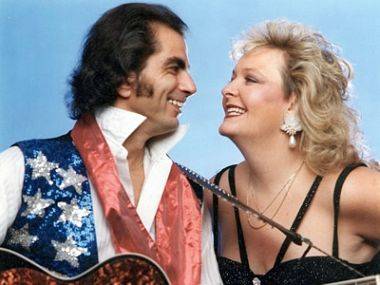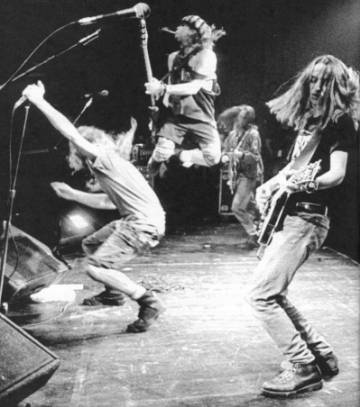 The inevitable sadness begins to set in, that this is the last day, and we are only one screening away from saying farewell to another Ebertfest. It’s a lot like the anticipation of Christmas Day, and that unavoidable post-present depression that kicks in once all the festivities are over and there’s nothing left to look forward to; like a madcap flash of carnival, the big show is about to pull up its big top and leave town. I dig my heels in and cling to that one last thrill in the knowledge of what’s to come: the real world awaits just around the corner.
The inevitable sadness begins to set in, that this is the last day, and we are only one screening away from saying farewell to another Ebertfest. It’s a lot like the anticipation of Christmas Day, and that unavoidable post-present depression that kicks in once all the festivities are over and there’s nothing left to look forward to; like a madcap flash of carnival, the big show is about to pull up its big top and leave town. I dig my heels in and cling to that one last thrill in the knowledge of what’s to come: the real world awaits just around the corner.
The thing which has made this Ebertfest such an experience is that it has renewed my excitement about movies. And after a long, terrible winter, this movie marathon has sort of awoken me intellectually, and the sponge in my head isn’t quite ready to see its reservoir cease pouring it on. Since 2009 was such a deprived year for good cinema, festivals like this are integral to realizing there are still great movies being made, and there are hidden gems out there worth mining.
10:40am: I join my husband in line wrapped around the theater, which is quite paltry on this drizzly day. Though my husband got in line just a little over an hour from when the doors open, we are not too far from the first turn around the building. To our amazement, the staff is late once again, and doesn’t let us in until 11:10am, less than an hour before the movie starts. Once we are let inside, we can’t believe our luck as the cattle are funneled through only two of the auditorium doors, and we “stroll” to the empty doorway on the far right, claiming our aisle seats only one row in front of our usuals. Perfecto!
11:30am: I overhear two elderly ladies talking in the restroom about how “Ebertfest has gone downhill,” and I could not disagree more. While last year I was disappointed in the selections because there were two films I downright despised, and had seen four of the films already, the caliber of movies chosen this year lifted my spirits and made me proud to be a cinephile. While each year, the absence of Roger Ebert’s stage presence in the panel discussions becomes more and more underscored with each humdrum discussion and awkward question, there’s really no getting past that, unless the best of these moderators would be called on to take charge of each panel (I’m looking at you, Richard Roeper). But when it comes to the movies, each year is akin to Forest Gump’s box of chocolates. This year was a box of winners for me, personally. My very first experience of seeing “Apocalypse Now!” is one I will never forget, thanks to Roger Ebert making the decision to showcase this classic film and display its bombastic glory on the Virginia’s mammoth screen.
11:50am: I see the lady who liked my “tattoo tights” last year and she takes a picture of me in all my paisleyed glory. Honestly, little moments like this, and chatting with our surrounding fest-friends are one of the best things about this annual event. I will miss our shared laughs and of course, the ongoing seat dramas.
12:00pmish: Roger Ebert comes out one last time with Chaz and does a Vincent-esque spin on stage. For some reason, emulating Vincent never gets old; I guess we’re all spinning showmen at heart, it’s just that “Riveracci” likes to do it multiple times a day in public in florescent suits. Chaz reports about the Virginia’s beloved organist, Warren York, and tells us that he never read the music he played, and so his diabetes won’t affect his ability to read the Wurlitzer music. She says he is well enough to have been checked out of the hospital and is now in a nursing home, which sounds more sad than hopeful to us hoping for his comeback. Apparently, Mr. York has made a recommendation for someone to replace him for next year’s festival should he be unable to attend. This is bittersweet news; without the sound of Warren’s jaunty Wurlitzer tunes, his bright red socks flashing as he plays, it’ll never be the same, much in the way Ebert’s voice is missed.
Nate Kohn and Mary Susan Britt present Roger with a framed photograph of him moderating a panel discussion with his “far-flung correspondents” (Can I just say, thank God I never have to hear that phrase uttered again?) Then, Chaz introduces the director of the film we’re about to see, Song Sung Blue. This is Greg Kohs’s first feature-length independent documentary, and he doesn’t want to say too much about it before we’ve been able to see it for ourselves. I like it when directors take this route; it’s just best to let people see things first and hear about the intricacies that went into them afterwards, in my opinion.
 12:15pmish: Song Sung Blue screens. It is a shockingly unabashed picture of a family whose patriarch and matriarch head a Neil Diamond cover band called “Lightning & Thunder.” After a series of setbacks that would turn most people onto reality and quit their dreams cold turkey, Lightning and Thunder prevailed through the best of times and the worst of times. One of the most surprising moments in the film (and there are two of them) stars Pearl Jam frontman, Eddie Vedder. While at Milwaukee’s huge music festival, the 1995 edition of Summerfest, Vedder invited the duo on stage to perform with him in front of the biggest audience of their lives. They didn’t even know who Vedder was, and a faraway look came in their eyes when they heard the name “Pearl Jam.” It’s one of those serendipitous documentaries, the kind of story you can’t believe the director happened upon and was able to shoot as some of the most emotional and harrowing events occurred right in front of the camera.
12:15pmish: Song Sung Blue screens. It is a shockingly unabashed picture of a family whose patriarch and matriarch head a Neil Diamond cover band called “Lightning & Thunder.” After a series of setbacks that would turn most people onto reality and quit their dreams cold turkey, Lightning and Thunder prevailed through the best of times and the worst of times. One of the most surprising moments in the film (and there are two of them) stars Pearl Jam frontman, Eddie Vedder. While at Milwaukee’s huge music festival, the 1995 edition of Summerfest, Vedder invited the duo on stage to perform with him in front of the biggest audience of their lives. They didn’t even know who Vedder was, and a faraway look came in their eyes when they heard the name “Pearl Jam.” It’s one of those serendipitous documentaries, the kind of story you can’t believe the director happened upon and was able to shoot as some of the most emotional and harrowing events occurred right in front of the camera.
2:00pmish: The movie is only 87 minutes long, but we don’t end up leaving the panel discussion and following performance by Thunder until 3:15pm, so I don’t know when anything else in between happened. The discussion is baffling and moving at times, especially when Thunder is welcomed with a standing ovation. She probably hasn’t seen a crowd this huge since that show at Summerfest so many years ago. She goes by her real name, Claire Sardina, now, and performs three songs—one of which, the Patsy Kline classic, “Crazy,” hits an emotionally moment of irony, as the lyrics closely mirrors the struggle Roger and Chaz Ebert have endured, as well as herself. Chaz comes out to be a part of the panel discussion for the first time and thanks Claire for putting her life on display for audiences to see, saying that people need to see the real-life struggles of others who go through pain and suffering after tragedy. Our friend Bob leans over to us and asks, “Am I the only one who is depressed by all of this?” No, it is all really sad for different reasons, from the faded dreams and failing voice of the aging cover band star, to the path her life has taken since the film ended. She doesn’t have any income outside of social security, and is looking to find a job soon to pay for her medical expenses, something she’d never had to do while performing on stage with her husband.
The brightest spot of the discussion is about Eddie Vedder. Seriously, I liked him and Pearl Jam before the film, but now I have great respect for him as a person. Watch this film and be moved by the humbleness and heart of this reluctant rock star. His heroism is magnified after the film director tells us that the movie wouldn’t have been released without Vedder’s help; having so much Neil Diamond music in it, the movie wasn’t actually legally cleared to be screened due to the music rights, and wasn’t exonerated until an hour before its official premiere at a festival. Somehow, in that small window of time, Vedder was able to reach Neil Diamond and tell him about the movie, and Diamond called the director and gave him his blessing straight afterwards.
Though the film was showcased in a few film festivals in 2008, it has not seen a proper theatrical release, and the director is still looking for a distributor. The likelihood of the film making much money is grim, as is the case with most documentaries, but it is a worthwhile movie to seek out for several great moments. “The goal of this movie is to make people happy,” says Kohs. Quoting Lightning, he goes on, “We’ll get there faster going slower.” Lightning wasn’t talking about distribution at the time, but the quote fits. Claire stresses the film is “a love story more than it is a musical.” And because we all need to be reminded of how love isn’t a highway of flowers and rainbows, “Song Sung Blue reminds us to be grateful in our good fortunes and to hang on when the going gets rough.
And so ends another joy ride at the movies. Tomorrow, we’ll leave the coziness of the dark and be born unto a shock of light and reality. It’s really not so bad, but when the light gets too bright, or the sights too grim, we know we can always return to that dark room and reflect on the lives of others, whether in fiction or documentary, to be reminded that whatever it is we’re going through, we are not alone. And that knowledge is enough to make the passing year to the next Ebertfest all the more bearable.








